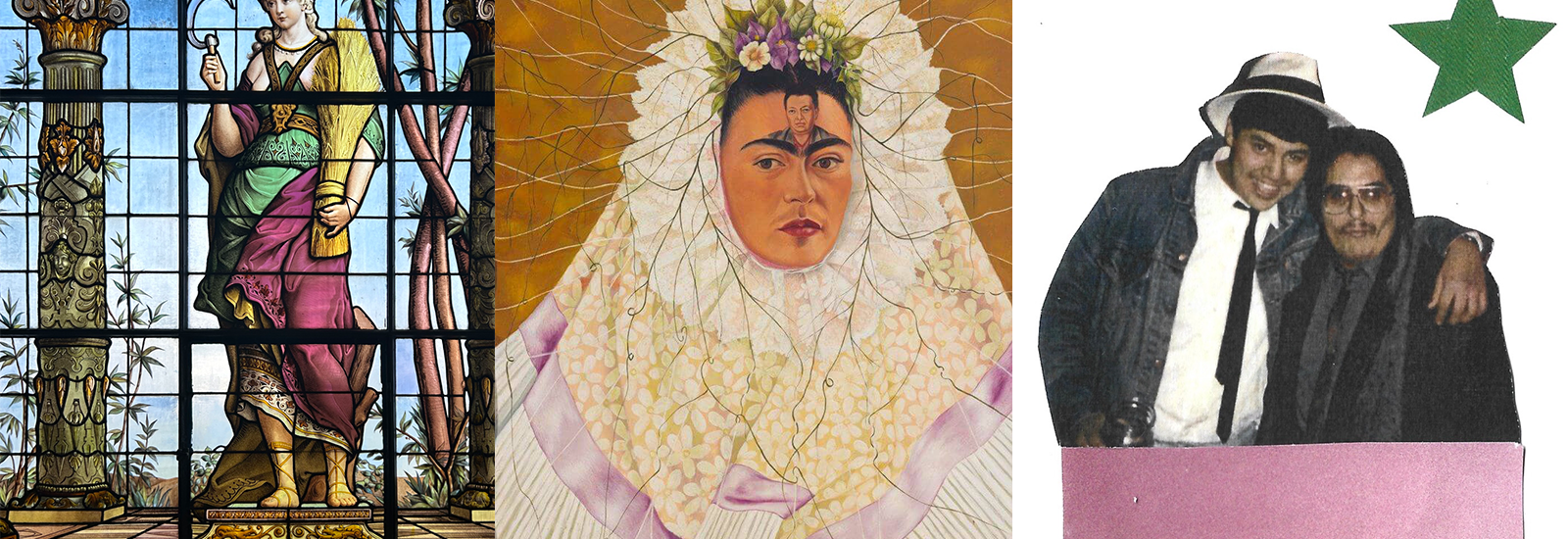The Global Arts and Humanities Graduate Team Fellowship Program aims to advance cross-disciplinary, team-based research cultures by brokering collaboration and facilitating the sharing of conceptual frameworks and disciplinary alignments. Bringing together varying academic perspectives, the fellowship encourages agility in methods and modes, creativity of mind and practice, and intellectual grit.
In a series of short, informal conversations held over Zoom, the 2021 cohort of Global Arts and Humanities graduate team fellows discussed a number of the conceptual frameworks and disciplinary alignments that inform their specific projects, including community-engaged research, ethnographic methods, and interdisciplinary approaches to the Arts and Humanities.
In a short Zoom discussion, graduate team fellows talked about what community-engaged research means for each of their degree projects. While “community-engaged research” is often nominally valued by the Academy, the discussants observed tensions that sometimes exist between Academy and Community, noting that the lines between the two are often blurry, and that “community” is not always well-defined.

KORTNEY MORROW: “I'm curious if being in the Academy and having a certain set of peers in the academy and a specific audience in the Academy has ever posed a challenge for you, being a community-oriented researcher? Do you ever feel like you're sort of living in two different worlds and translating between two spaces? Has it posed any challenges for you?”
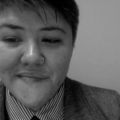
JOY ELLISON: “For me, when I think about this question what comes up to me is what does the Academy value what counts for tenure, what's funded, what gets us credit in our classes? That is not always work that’s valued by my community and some of the more community-engaged research and public facing presentations of research are ‘extra’ rather than counting for the heart of what we're evaluated on. So, there's a structural element to all of this that needs to be addressed in combination with the recognition that our communities create the knowledge that we record and are perfectly literate in the ideas that they created.”
Pushing back against some of the limitations of these scholarly norms, graduate team fellows approach community-engaged research and writing as a collaborative endeavor. Others try to think meaningfully about who the audience for their research, writing, or artistic work might be and to account for lived experiences and the “wholeness of people or beings in a community” rather than abstracting particular identities within Academic jargon.

JACOB KOPCIENSKI: “I'm also wondering about what it means to see the research process as this collaborative conversation.” …. “I find that there's this interesting sort of blurriness that's happening in some places, or at least in my work, where the edge between the Academy and the university is actually getting really murky because there are people that are maybe already existing in those spaces. So the traditional model would say “oh you're the researcher coming from the University entering the space,” and I find that that line is very blurry if not existent sometimes.”…..” I don't have a good definition of community. I feel like there's multiple communities at stake.”

JE: “I'm using my skills as a writer to respect what people wanted to say to the public and I think it's important to acknowledge that this is a form of theoretical intervention and also acknowledge that Trans people are not an abstract problem to be solved, and that that goes for a lot of different communities on various margins who are enduring various forms of oppression. And that when we think about what we value in the academy it needs to have room for those lived experiences rather than exclusively the kind of theoretical abstraction that is particularly celebrated in my own discipline.”
Graduate team fellows are sensitive to the ethics of their work, acknowledging that some of the people and communities they work with have the right to privacy and may desire to keep some elements of their lives outside of academic representation. This ending thought posed an opening for the subsequent mini discussion on ethnography and related methods for conducting their research.
Ethnographic practice – producing knowledge of the world through understanding its social relations – constitutes one of the central research methods across the Arts and Humanities. In a short Zoom discussion graduate team fellows talked about the practical and ethical concerns that inform the content of their research and artistic practice as well as how they produce it through ethnography. Though graduate team fellows acknowledge that ethnography and adjacent methods such as oral history might look different for each researcher and their individual projects, they are all thoughtful about how ethnography emerges from and informs their work and how it might be used as a decolonizing practice. They ask how researchers should create and sustain relationships with the people or communities they study? What kinds of relationships are appropriate? How should the knowledge created in these relationships be shared, and with whom? Ethnographic practice is seen as relational and collaborative.
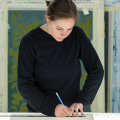
LYDIA SMITH: “I’ve thought a lot about how gift giving might be present in the way that work is made through this process and how one works with Community in the process of doing collaborative ethnography.”
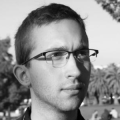
JACOB KOPCIENSKI: “I tend to think a lot about what I’m doing ethnographically as really understanding how I'm entering community and understanding that that's always changing as relationships build or maybe fade as communities change.”
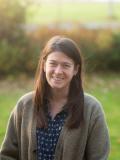
SARAH CRAYCRAFT: “I still don't see how you actually exit a project or exit relationships, once the formal fieldwork part ends, but I do feel that kind of weighing heavy sometimes, the feeling like I still need to give more or to think about how I haven't fed this relationship in a long time. So I think there is a good burden that we need to think through and be careful about when you're engaging with communities.”
Jacob Kopcienski (PhD Musicology/Ethnomusicology) sees “ethnographic practice as something that exists before and after a traditional fieldwork model of going in and interviewing people” and thinks about what it means to enter and exit community with people such that one might “use those moments as ways of trying to define some of our projects and our questions a little bit more thoughtfully and carefully.” Sarah Craycraft (PhD Comparative Studies/Folklore) similarly views ethnographic practice as a way to reflect on one’s own positionality and responsibility towards the communities researchers form relationships with in ways that last beyond the research period.

LS: “For me, it's close looking and deep listening that I take from ethnography as the main things.”
Lydia Smith (MFA Painting and Drawing) considers ethnography to be a form of attention – close looking and deep listening – that ethically and phenomenologically empowers people to observe and understand the world, such that knowledge might be conveyed through artistic practice in addition to scholarly publications and other kinds of academic forms.
Joy Ellison and Henrique Takahashi (PhD Spanish and Portuguese) consider the decolonizing possibilities of ethnography and community-based storytelling more broadly.
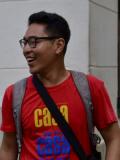
HENRIQUE TAKAHASHI: “As we know, anthropology and ethnography as a method have a history tied with colonialism. For example, if you see all the anthropologists that went to Latin America, Africa, and Asia have this role with colonialism. I was wondering if it's
possible to create or make a decolonial ethnography?”

JOY ELLISON: “I'm very optimistic that storytelling and recording our sense of ourselves is a profoundly human impulse that is profoundly anti-oppression, including anti-colonial. I am much more skeptical of the University's ability to be a part of that, but I think that we as people who are a part of the University have a tremendous amount of power to begin, and especially as we continue our careers, this process of valuing things differently and looking towards the structures that would allow more anti-oppressive work to be done.”
As they are pursuing their projects, graduate team fellows question the norms of how research is done. They take seriously the practical and ethical concerns of ethnographic and related methods, and in doing so, they open up new avenues of understanding for their interdisciplinary projects.
As they are pursuing their specific projects, graduate team fellows devise ways of developing understanding that often break the norms of any one discipline’s practices. Different disciplines across the Arts and Humanities have norms of publication formats, standards of evidence, and kinds of data that are widely used. Graduate team fellows’ interdisciplinary projects, however, seem to require rethinking or resituating their work in ways that are not always in alignment with those norms. In a conversation over Zoom, graduate team fellows discussed the topic of interdisciplinarity in the Arts and Humanities and how they have approached the promises and limitations of interdisciplinarity within their own work. In addition to knowledge creation, interdisciplinary work has the potential to allow imagination and the formation of relationships within and beyond the University to flourish.

LYDIA SMITH: “I think interdisciplinarity is something that a lot of people are excited to talk about. It's a buzzword and it's an exciting way of reframing the way we look at relationships in the academic spaces, but sometimes I think I feel like I've had to really push for it myself or find ways to do it on my own terms and make those spaces for myself rather than having them just given to me. It's about really pushing across the borders of discipline and making relationships with other people and seeing what is present.”
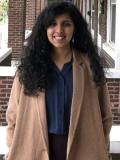
PREETI SINGH: “Interdisciplinarity can be used as a key to unlock certain canonical assumptions behind disciplines to open them up to different ideas and different locations.”

KORTNEY MORROW: “My poetry is talking and in conversation with many different ideas, both in the present but also in the past. And so, for me to be the best poet, I need to be able to have a better understanding of civil rights and the Black power movement [for example] because that's going to inform my work today.”
Graduate team fellows feel that an interdisciplinary approach gives them a broad range of knowledge, perspectives, and tools that beneficially inform their work and may even expand the audience for that work beyond the silo of academic discipline.
Despite the promises of interdisciplinarity in the Arts and Humanities, graduate team fellows are also aware of the potential limitations of this work. As graduate students they have to be aware of practical concerns such as research funding, employment, or participation in scholarly research forums that have certain disciplinary norms. Yet the graduate team fellows are also conscious of their own reasons for doing research and their ethical commitments as researchers. They acknowledge that letting those reasons drive their inquiry is important to their process.
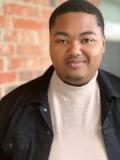
ROBERT BARRY JR.: “I'm always thinking about the stakes of engaging within those various [academic] areas, and what my project would look like without the other area. And when I get confused or when I think I should be going in various different directions, I put [my] three areas back in front of me. What would happen to my project if this was absent? So that makes me think about the integrity of my project, but also just making sure I'm holding those areas with care so that my project has meaning to them.”

PS: "How do we engage with other disciplines? How do we cite in particular ways when we're engaging these other disciplines because I feel that within each discipline there are kinds of conversations about citations, about ethics, and then what kind of voices do we center from these disciplines? For example, does interdisciplinarity allow for bringing voices that are not often recognized, or that are at the margins of a particular discipline? Or does it kind of sideline them in a way?...I feel that these are ethical questions and I often grapple with how to understand them and be part of that debate and include that debate in my own work."
Graduate team fellows discuss decisions about the Form that their projects take as one such path towards grappling with the ethics and practicality of doing interdisciplinary work.

KM: “There can be a playfulness to the Form choices we're making as artists, as researchers, as writers. And I think we have a chance to really push the boundaries on how we want our work to exist in the world, because it doesn't have to just be the path we've been given.”

LS: “I think in making visual artwork, One encounters the Form first and then the content unfolds, but also, I think, from the reverse. Form can be very emergent. Sometimes I think what interdisciplinary allows is for the Form to reveal itself through process.…[This reminds me] about how important it is to have these different creative practices and Forms available to us in institutions where many different skills and ways of having knowledge and holding knowledge is available to students…. it's hard to find space for someone to have an interdisciplinary background. How does one then fit into the Academy? Maybe the Academy needs to figure out ways that these forums can actually fit to hold us.”
Graduate team fellows note that interdisciplinary projects often take more time to complete because they incorporate multiple conversations, multiple academic fields, and have multiple outlets for the end products. Though Interdisciplinary paths are individual and sometimes unique, interdisciplinary scholarship is valuable because projects are crafted by scholars for knowledge-making in response to particular interests and social needs.
Emerging from these three discussions, the graduate team fellows ultimately ask how the University might sustain interdisciplinarity in the Arts and Humanities. How might the values of Academia shift to align with the positive societal impact of interdisciplinary practices? And how might the resources and time necessary to complete this work be supported in the long run? Kortney Morrow posits the Global Arts and Humanities Graduate Team Fellowship as one avenue for sustaining interdisciplinary work in the Arts and Humanities. “This fellowship…gave me space and time and a community of people to pull back from all of the tasks of Academia to really dive deep into my work and think about methods and interdisciplinarity in a real, critical way. I'm hopeful that the institution at large will not only continue this fellowship, but also potentially expand it and expand opportunities for other people whose work and whose selves would be truly benefited from this opportunity.”
The 2021 cohort of graduate team fellows included eight graduate students. Currently, Robert Barry Jr., Henrique Yagui Takahashi, and Jacob Kopcienski are finishing their degrees. Lydia Smith, Sarah Craycraft, Kortney Morrow, Joy Ellison, and Preeti Singh have completed their respective degrees. Morrow continues to write poetry from her studio in Cleveland, OH. Smith is now a member of Automat Collective in Philadelphia, Pennsylvania. Ellison is an Associate Professor of Gender and Women’s Studies at the University of Rhode Island. Singh is an A.W. Mellon Postdoctoral Fellow at Dartmouth College.

